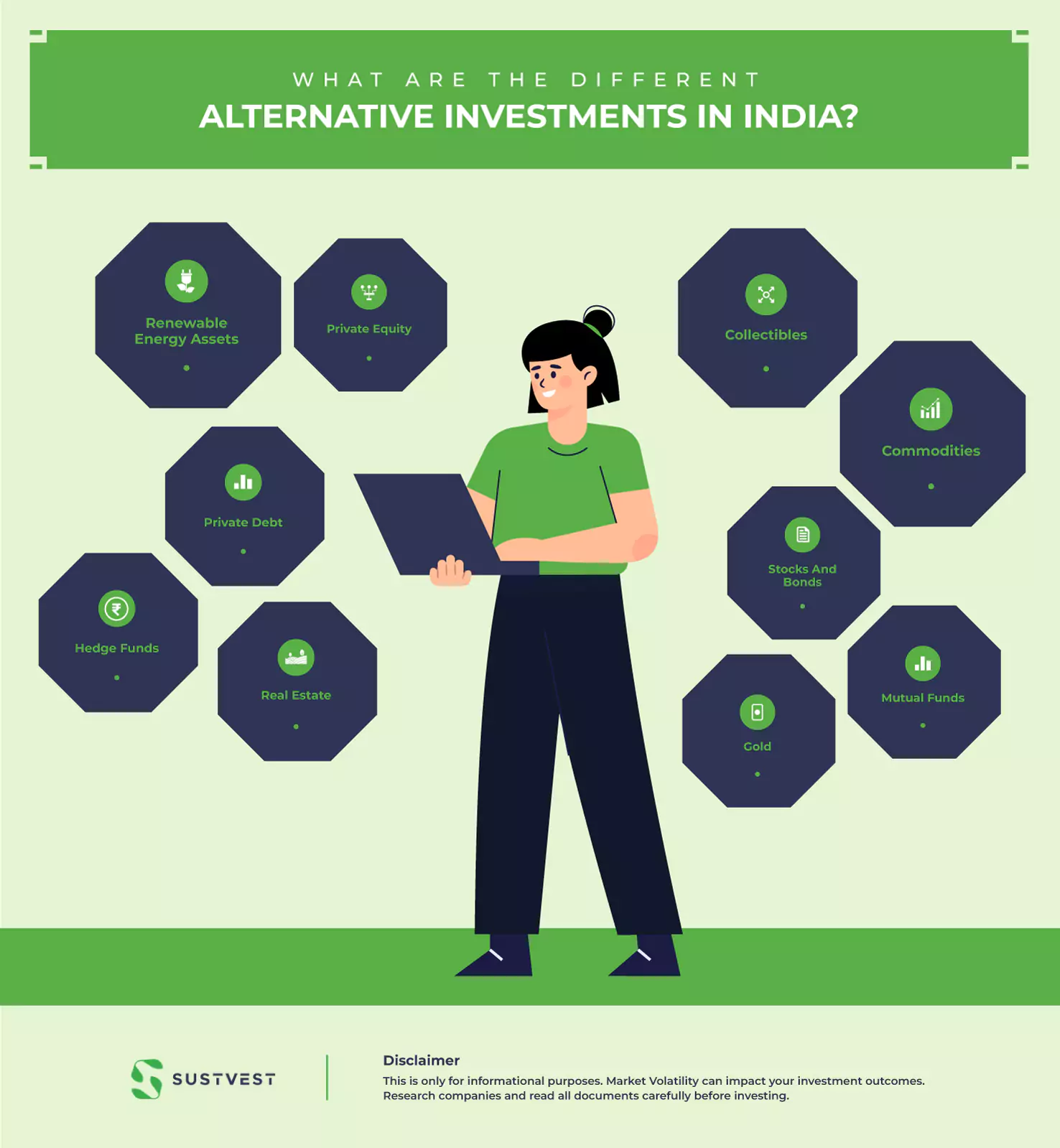Isn’t it confusing to scroll through the internet only to find the same old, common investment alternatives for everyone? Each person has different values, based on which they decide whether to invest as their previous generations did or carve their way in this ever-evolving world.
In this article, we will learn what are the different alternative investments in India. We will help you pick the right fit from the ocean of investment options.

What Are Alternative Investments?
Understanding alternative investments is important before one begins investing in them. When you think of “investment,” you probably picture stocks, gold, real estate, a fixed deposit, or cash. But with changing times and increasing inflation rates, relying solely on traditional investment options is no longer advisable. In other words, putting all your eggs in one basket isn’t the best strategy. So, it’s imperative to diversify your portfolio and consider alternative investment options to safeguard your financial future.
There are various forms of investment alternatives in the market. Various investment alternatives offer different volatility levels (risk levels) and liquidity that are suitable for recent times. For instance, our fathers may not have considered investing in renewable energy assets like solar and wind projects, nor did they buy gold bonds.
The bottom line is that alternative investments add diversity to your portfolio. These dynamic alternative investments could not only help you achieve your passive income goals but also help you build your retirement fund.
Why Start Looking For Different Alternative Investments in India?
Thirty years ago, a house in a Tier 3 city cost roughly between 2 and 5 lakhs. However, now it has risen to 20 to 40 lakhs. Yes, you could argue that income and the cost of living were lower during those times too. But it’s worth noting that in those days, one consistent investment or pension fund was sufficient to achieve your life goals. Is it the same scenario now? Quite simply, no.
Economic conditions, market dynamics, and investment options have evolved, and relying solely on fixed deposits for investment or retirement planning may not be as feasible now.
Investing in different investment alternatives is like letting your money multiply. With shares and mutual funds, you can let compounding work its magic and enjoy a steady retirement fund. However, investing in underrated alternatives like green energy can yield higher returns over time and contribute to a more sustainable future.
What Are the Different Alternative Investments in India?
Our article aims to inform you of the top 10 different investment alternatives in India that can outperform traditional investments in terms of financial returns.
- Renewable Energy Assets
- Private Equity
- Private Debt
- Hedge Funds
- Real Estate
- Collectibles
- Commodities
- Stocks And Bonds
- Mutual Funds
- Gold
- Renewable Energy Assets
According to the International Energy Agency, solar energy could be the world’s largest source of electricity by 2050.
If we talk about India, which ranks fourth globally for installed renewable energy capacity, it won’t be long before it jumps up a few spots. Moreover, being a low-cost, zero-carbon energy source, solar energy has the power to heal the earth by cutting down on pollution.
As the world shifts towards sustainable energy sources, it’s clear that renewable energy assets will soon surpass fossil fuels in terms of viability and profitability. Investing in renewable energy is already proving to be a wise choice, as both the government and private sector are investing heavily in solar energy, wind energy, and hydropower. This makes renewable energy assets one of the top picks in the types of alternative investments.
There are two ways to invest in renewable energy assets as alternative investments in India:
- Invest in shares and bonds of a company that generates or supplies electricity from renewable energy assets, i.e., power generation and distribution companies like Tata Power, Adani Power, NTDC, solar glass manufacturing companies, electric vehicle manufacturing companies, biogas production government agencies, and so on.
- Or invest through a sustainable investment platform like SustVest. You can start with as little as 5000 INR and have fractional, and digital ownership of renewable energy projects like solar or EVs. You can enjoy up to 15% of your returns by investing in green assets and doing your bit to save the planet.
For more details on solar energy investment, check out our blog on What are the Different Solar Finance Options in India here.
2. Private Equity
In private equity, an investor buys equity capital, or, in simple terms, a significant stake in a private company, hoping to achieve maximum financial gains while selling the stake.
Typically represented by private equity firms, these investors often invest in struggling companies, using their management expertise to increase the company’s value and eventually sell it for a hefty profit.
Private equity firms are not publicly listed on stock exchanges, so retail investors can’t invest in private equity through the primary markets. However, they can invest through alternative investment funds (AIFs) monitored by SEBI.
It’s also important to be aware of the higher risks and longer lock-in periods associated with private equity investments before diving in.
- Private Debt
Private debt is similar to private equity to a great extent. However, instead of buying a stake in a company through investing in shares, it involves offering debt to the company as loans, bonds, or other debt instruments and earning returns in interest payments.
Private debt investors, also known as private credit investors, have become popular owing to the global monetary crisis. These private investments can take many forms, including senior secured loans, subordinated debt, mezzanine financing, and convertible debt.
Retail investors can invest indirectly through alternative investment funds (AIFs), as some AIFs in India invest in private debt securities. Although you must keep in mind – just like private equity, the lock-in period and risk factor are a matter of concern when investing in private debt.
- Hedge Funds
You may consider hedge funds as financial institutions that trade across different financial markets. Hedge funds pool money from individuals, companies, and investors and invest in currencies, commodities, derivatives, equities, and securities.
Hedge fund managers are in charge of assessing risk, implementing strategies, and generating returns on the funds. And when they succeed, they receive a performance fee.
Hedge funds specialize in multiple strategies like global macros, long-term equity, macroeconomic models, mathematical trends, etc. Under certain conditions, you may invest in hedge funds using alternative investment funds.
- Real Estate
Real estate has always been popular among alternative investments in India. But unlike in old times, investing cash in land, commercial space, or residential projects can be quite a financial burden. But don’t worry. There’s a more efficient and more convenient way to invest in real estate – through Real Estate Investment Trusts (REITs).
REITs allow you to invest in parts of real estate projects without burning a hole in your pocket. By pooling money from investors, they invest in various properties and manage them on behalf of the investors. As an investor, you can earn regular income in the form of rent without worrying about managing the property.
REITs come in various types, including equity, mortgage, hybrid, and public non-listed REITs. Introduced in 2014, you can invest a minimum of 50,000 INR for 200 units.
- Collectibles
Collectibles can be a fun and unique way to invest your money. They are tangible assets that hold value beyond their practical use and can make an excellent addition to any investment portfolio.
Savvy investors recognize the worth of diverse assets such as artwork, stamps, coins, rare jewelry, limited edition luxury bags, vintage cars, comic books, toys, or figurines and choose to invest in them with the expectation of receiving substantial returns in the future.
Take, for example, the Detective Comics issue featuring the debut of Batman, which sold for a staggering $1.125 million in 2020. With proper knowledge and expertise, investing in collectibles can be an exciting and lucrative venture.
- Commodities
Investing in commodities is like entering a treasure trove of potential profits.
Commodities as an alternative investment include everything from metals (e.g., gold, silver, platinum, and palladium) and fuels (e.g., crude oil, natural gas, and gasoline) to food products. (e.g., coffee, cocoa, sugar, and so on).
You can invest in commodities by holding them physically or buying an ETF (exchange-traded fund) that tracks their indexes on the stock market.
But if you’re up for a bit of a thrill, try investing in the future. Futures are a way for investors to hedge against price fluctuations of a commodity by locking in a future price and date. It’s a bit like a roller coaster ride, with the potential to make generous profits or lose money substantially!
- Stocks and Bonds
Most Indians invest in stocks and bonds – the most popular alternative investments in India. But what’s the difference between the two? Let’s break it down:
Stocks: When you buy a share of stock, you become a part-owner of a company. As the company grows and makes profits, your share value increases, leading to higher returns. It’s like owning a tiny piece of a company that could become the next big thing.
For example, if you had bought a share of MRF in 2010 for 6595 INR, your investment would have been worth a whopping 86,200 INR today (MRF is the highest-priced share in the Indian stock market).
Bonds: Buying bonds is like lending money to a company or government. You’re not an owner like with stocks, but rather a lender. They promise to repay you with interest on the maturity date. Bonds can have fixed or variable interest.
- Mutual Funds
Mutual funds are popular alternative investments in India, especially for those who don’t have the time or expertise to manage their investments.
Professional fund managers do the hard work for you by carefully selecting a mix of shares, stocks, securities, and bonds to create a diversified portfolio. This portfolio helps diversify your investments to reduce the risk and increase the potential for higher returns.
You can start investing in a mutual fund with as little as 1000 INR per month through a systematic investment plan (SIP), or go big and invest a lump sum amount all at once.
But remember that there are different fees associated with mutual funds, such as management fees, expense ratios, and exit fees. Some common types of mutual funds are small-cap funds, mid-cap funds, and tax-saving funds, among others.
- Gold
Generations of Indians have consistently considered gold to be a part of reliable alternative investments in India. In 2010, 10 grams of gold were worth just 18,500 INR, but fast forward to 2023, and the prices have soared to a staggering 62,000 INR!
Physically holding gold is termed a “traditional investment.” However, investing in gold ETFs, sovereign gold bonds, or digital gold is a form of alternative investment that generates returns in the form of interest and price fluctuation.
- Sovereign Gold Bonds are government-issued securities that let you buy gold in the form of bonds, which earn interest and are redeemable at maturity.
- Digital gold is a relatively more recent form of investment where you can buy gold online and hold it digitally.
- With gold ETFs, you can buy and sell gold ETFs on the stock market and earn returns from price movements.
Check our blog on Top 9 Fixed Income Investing Strategies In India here for more details on investment strategies.

FAQs: What Are the Different Alternative Investments in India?
What are some unconventional alternative investments in India?
Here is a list of some unconventional alternative investments in India:
- Invest in Solar project- with the help of SustVest
- Peer-to-peer lending
- Antique trading
- Fractional real estate
What is the need for alternative investments in India?
Alternative investments in India provide investors the opportunity to diversify their portfolios, reduce the effect of market volatility and fulfill their long-term growth objectives.
How to Invest in Alternative Investments?
- Research: Learn about available alternatives like real estate, mutual funds, gold, and startups.
- Diversify: Allocate a portion of your portfolio to alternatives to spread risk.
- Due Diligence: Thoroughly research and understand the risks associated with your chosen alternative investments.
- Consult an Advisor: Seek advice from a financial advisor or consultant for personalized guidance.
- Monitor and Adjust: Regularly review and adjust your alternative investment strategy to align with your financial goals.
Summing Up
Congratulations! You’ve just unlocked the knowledge to answer the burning question: “What are the different alternative investments in India?”
We know investing can be intimidating, especially if you’re trying to balance financial goals with environmental consciousness. But with proper knowledge, you can make informed decisions that will pay off in the long run.
As responsible individuals, we must ensure that future generations inherit a sustainable planet. By choosing to invest in environmentally conscious alternatives, you can make a positive impact on the world while still earning a profit. Remember, a healthy planet is the foundation for a prosperous future.
Hence, SustVest offers an innovative investment platform that enables you to play your part in protecting the environment while earning steady returns by investing in renewable energy projects with a minimum investment requirement of 5,000 INR.
Find your perfect match! Choose a renewable energy project that aligns with your values and financial goals, and start earning returns with SustVest today!

Founder of Sustvest
Hardik completed his B.Tech from BITS Pilani. Keeping the current global scenario, the growth of renewable energy in mind, and people looking for investment opportunities in mind he founded SustVest ( formerly, Solar Grid X ) in 2018. This venture led him to achieve the ‘Emerging Fintech Talent of the Year in MENA region ‘ in October 2019.




